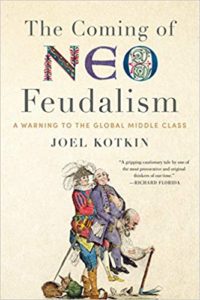
I’ve just started reading a book that, annoyingly, I planned to write someday. Joel Kotkin got there first with the The Coming of Neo-Feudalism: A Warning to the Global Middle Class, about the decline of the middle class, falling social mobility and the return of something like a pre-modern caste system.
This is not feudalism in a literal sense, but it is in some ways a return to the tripartite division of the Middle Ages — those who pray, those who fight and those who work.
The new castes are the oligarchy — a small number of very rich people, getting richer, and mostly in finance — and what Coleridge called the clerisy, the wider university-educated, especially those who work in media, academia and education. I’d categorise it as FT readers and Guardian readers. Kotkin writes:
On the whole, they share a common worldview and are allies on most issues, though there are occasional conflicts, as there were between the medieval nobility and clergy.
These two castes, similar to Picketty’s Brahmin Left v Merchant Right, are respectively progressives and liberal, but despite those differences, they all fear the third estate, ‘the people’.
I would add to this a fourth caste, the legion of low-skilled migrant workers who form an underclass in most western cities. The top two castes have an interest in promoting both this fourth caste’s interests and numbers (even though these two things clash), one for emotional and moral reasons, the other for financial gain.
The bad news is that, and I think he gets to this later, all the good things we enjoy, like democracy and political moderation, depend on a strong middle class, because countries with hour-glass social structures are prone to extremism and various sorts of political madness.
The whole woke movement is probably not unrelated to America’s growing inequality, for example. It may in one sense be a way to distract from poverty-related problems, and certainly concepts like ‘white privilege’ appear to reduce sympathy for the poor.
I also suspect that, as the middle class declines in fortune and graduates increasingly find it hard to buy a home and form a family, so the need grows to take comfort by identifying against the third estate. The statue unveiled in Bristol this week, of a fat man in a wheelie bin next to the tedious James O’Brien-level talking point about St George being Turkish, is an example of that compensating mockery.
I appreciate it sounds disingenuous for a Conservative voter to talk about snobbery; and having grown up in the waters of Thatcherism I can see how the idea of getting on your bike led to the current disdain about Brits not doing the jobs immigrants do. But in the end a lot of politics comes down to class interests. Marx wasn’t wrong about everything, after all.










Join the discussion
Join like minded readers that support our journalism by becoming a paid subscriber
To join the discussion in the comments, become a paid subscriber.
Join like minded readers that support our journalism, read unlimited articles and enjoy other subscriber-only benefits.
Subscribe